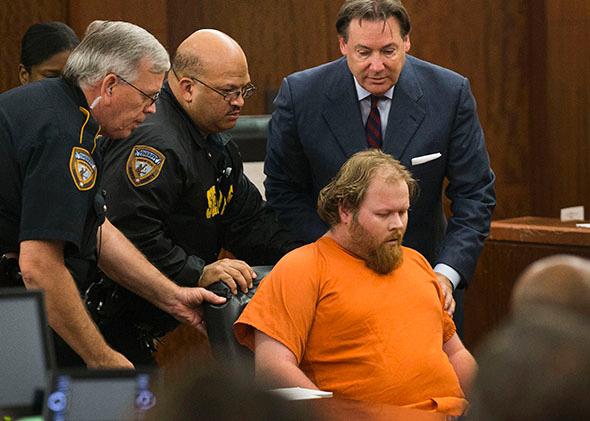On Wednesday, Ronald Lee Haskell allegedly broke into his former sister-in-law’s home in Spring, Texas and killed her, her husband, and four of her five children. (The fifth was also shot, execution-style, but survived, and reportedy saved her grandparents’ lives by calling 911 before Haskell could get to their house.) After a three-hour stand-off with police, Haskell surrendered and has been charged with the murders.
From the reporting of the past few days, the spree appears to have been Haskell’s attempt to get revenge on his ex-wife’s family. To no one’s great surprise, Haskell had been arrested for domestic violence in 2008, and his ex-wife filed a protective order against him in 2013. All of which leads to the question: Considering the laws put in place, both on federal and state levels, to prevent domestic abusers from getting guns, how did Haskell get one?
While we don’t know yet if the gun Haskell used was legally obtained, Hannah Levintova and Dana Liebelson put together a chilling report at Mother Jones that shows that, due to multiple loopholes that the NRA fiercely lobbies to protect, “his case appears to be the latest example of how easy it remains for domestic abusers to possess firearms, thanks to weak legislation.”
Haskell was charged with domestic violence for allegedly punching his wife in the face in front of their children in 2008, but he was able to plea down to simple assault instead of domestic assault, keeping him free and clear to buy a gun. And while laws prevent people under protective orders from buying guns legally, Haskell converted the protective order against him into a “mutual restraining order” as part of the terms of he and his wife’s divorce decree, which again freed him up to buy a gun.
This kind of legal finagling is fairly common and unlikely to change any time soon. The objective of prosecutors and divorce attorneys is often to help the victim get away from her abuser as quickly as possible so she can get on with her life, which gives the abuser a lot of leverage to plea down or get friendly divorce decrees in exchange for not dragging out the case. Because of this, preventing abusers from getting guns means that we need more expansive gun laws. But as Levintova and Liebelson report, the NRA has fought tooth and nail against any efforts to keep guns out of the hands of scary men who have murderous impulses towards exes.
Levintova and Liebelson zero in on three major loopholes in federal law that make it all too easy for abusers to get guns: “The current law doesn’t apply to misdemeanant stalkers, domestic-violence misdemeanants who are current or former dating partners but who’ve never cohabitated or had a child together, as well as accused partners subject to a temporary (rather than permanent) restraining order.” Some states have stricter laws, but unsurprisingly, in red states like Texas, lax gun laws mean that many abusers have no problem getting legal access to a firearm. The result is that these states have more domestic murders committed by gun than other states.
Unfortunately, the NRA tends to treat any attempt to strengthen laws keeping domestic abusers from guns as nothing more than a backdoor way to take away everyone’s guns. In response to a bill proposed by Sen. Amy Klobuchar to close the loophole that allows convicted stalkers and abusers convicted of hitting partners they weren’t living with to buy firearms, the NRA sent a letter to senators saying the bill “manipulates emotionally compelling issues such as ‘domestic violence’ and ‘stalking’ simply to cast as wide a net as possible for federal firearm prohibitions.”
The depressing part is that even closing these loopholes probably wouldn’t have stopped Haskell. But if we can’t even pass laws barring stalkers and girlfriend-beaters from owning guns, then more serious measures, the kind that may have prevented this Texas tragedy, don’t have a chance.
